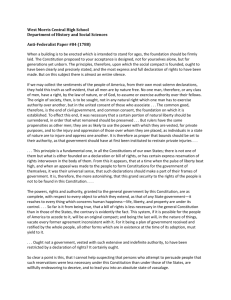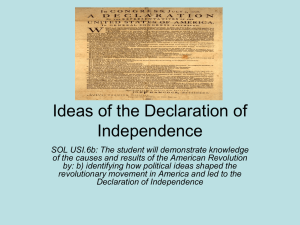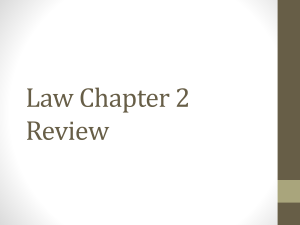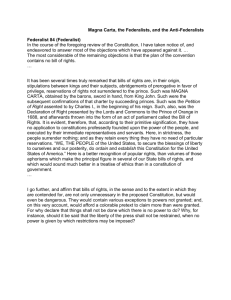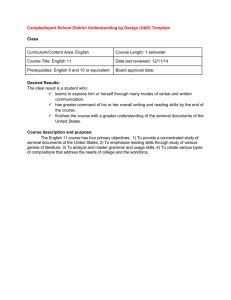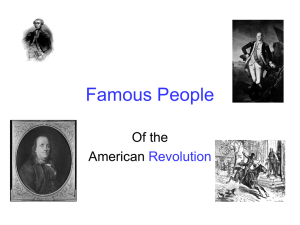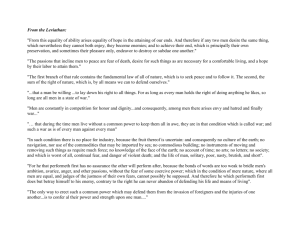Karl Marx: Excerpts from: “On the Jewish Question”
advertisement
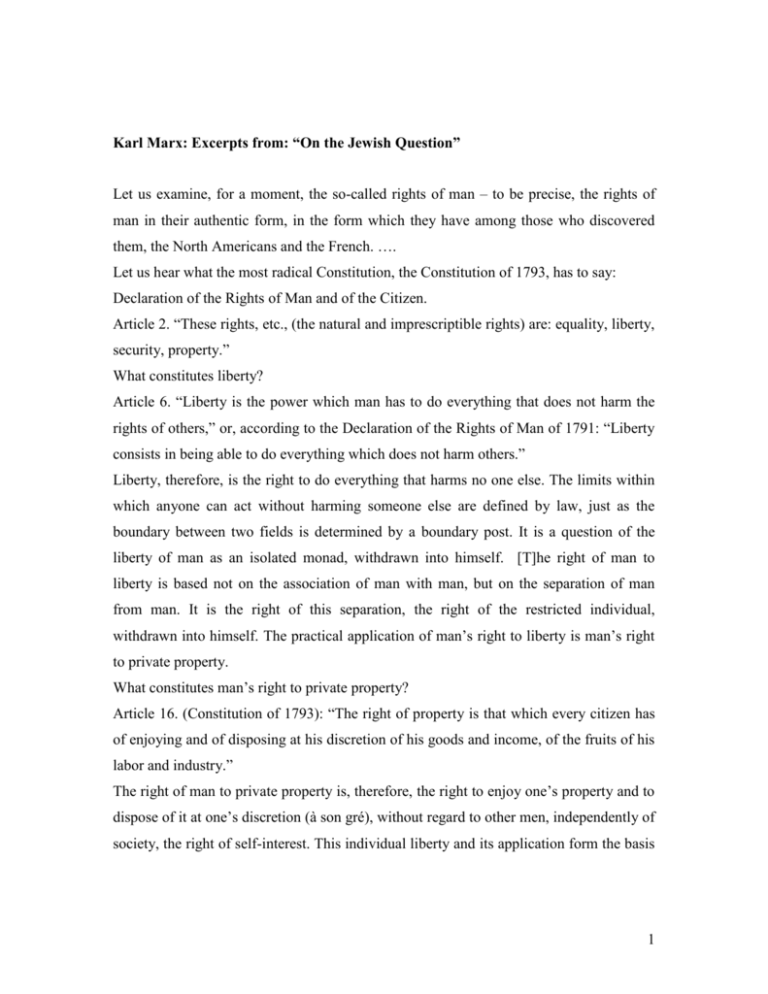
Karl Marx: Excerpts from: “On the Jewish Question” Let us examine, for a moment, the so-called rights of man – to be precise, the rights of man in their authentic form, in the form which they have among those who discovered them, the North Americans and the French. …. Let us hear what the most radical Constitution, the Constitution of 1793, has to say: Declaration of the Rights of Man and of the Citizen. Article 2. “These rights, etc., (the natural and imprescriptible rights) are: equality, liberty, security, property.” What constitutes liberty? Article 6. “Liberty is the power which man has to do everything that does not harm the rights of others,” or, according to the Declaration of the Rights of Man of 1791: “Liberty consists in being able to do everything which does not harm others.” Liberty, therefore, is the right to do everything that harms no one else. The limits within which anyone can act without harming someone else are defined by law, just as the boundary between two fields is determined by a boundary post. It is a question of the liberty of man as an isolated monad, withdrawn into himself. [T]he right of man to liberty is based not on the association of man with man, but on the separation of man from man. It is the right of this separation, the right of the restricted individual, withdrawn into himself. The practical application of man’s right to liberty is man’s right to private property. What constitutes man’s right to private property? Article 16. (Constitution of 1793): “The right of property is that which every citizen has of enjoying and of disposing at his discretion of his goods and income, of the fruits of his labor and industry.” The right of man to private property is, therefore, the right to enjoy one’s property and to dispose of it at one’s discretion (à son gré), without regard to other men, independently of society, the right of self-interest. This individual liberty and its application form the basis 1 of civil society. It makes every man see in other men not the realization of his own freedom, but the barrier to it. But, above all, it proclaims the right of man “of enjoying and of disposing at his discretion of his goods and income, of the fruits of his labor and industry.” There remains the other rights of man: égalité and sûreté. Equality, used here in its non-political sense, is nothing but the equality of the liberté described above – namely: each man is to the same extent regarded as such a selfsufficient monad. The Constitution of 1795 defines the concept of this equality, in accordance with this significance, as follows: Article 3 (Constitution of 1795): “Equality consists in the law being the same for all, whether it protects or punishes.” And security? Article 8 (Constitution of 1793): “Security consists in the protection afforded by society to each of its members for the preservation of his person, his rights, and his property.” Security is the highest social concept of civil society, the concept of police, expressing the fact that the whole of society exists only in order to guarantee to each of its members the preservation of his person, his rights, and his property. It is in this sense that Hegel calls civil society “the state of need and reason.” The concept of security does not raise civil society above its egoism. On the contrary, security is the insurance of egoism. None of the so-called rights of man, therefore, go beyond egoistic man, beyond man as a member of civil society – that is, an individual withdrawn into himself, into the confines of his private interests and private caprice, and separated from the community. In the rights of man, he is far from being conceived as a species-being; on the contrary, species-life itself, society, appears as a framework external to the individuals, as a restriction of their original independence. The sole bond holding them together is natural necessity, need and private interest, the preservation of their property and their egoistic selves. It is puzzling enough that a people which is just beginning to liberate itself, to tear down all the barriers between its various sections, and to establish a political community, that such a people solemnly proclaims (Declaration of 1791) the rights of egoistic man 2 separated from his fellow men and from the community, and that indeed it repeats this proclamation at a moment when only the most heroic devotion can save the nation, and is therefore imperatively called for, at a moment when the sacrifice of all the interest of civil society must be the order of the day, and egoism must be punished as a crime. (Declaration of the Rights of Man, etc., of 1793.) This fact becomes still more puzzling when we see that the political emancipators go so far as to reduce citizenship, and the political community, to a mere means for maintaining these so-called rights of man, that, therefore, the citoyen is declared to be the servant of egotistic homme, that the sphere in which man acts as a communal being is degraded to a level below the sphere in which he acts as a partial being, and that, finally, it is not man as citoyen, but man as private individual [bourgeois] who is considered to be the essential and true man. “The aim of all political association is the preservation of the natural and imprescriptible rights of man.” (Declaration of the Rights, etc., of 1791, Article 2.) “Government is instituted in order to guarantee man the enjoyment of his natural and imprescriptible rights.” (Declaration, etc., of 1793, Article 1.) Hence, even in moments when its enthusiasm still has the freshness of youth and is intensified to an extreme degree by the force of circumstances, political life declares itself to be a mere means, whose purpose is the life in civil society(*). … But even if one were to regard revolutionary practice as the correct presentation of the relationship, there would still remain the puzzle of why the relationship is turned upside-down in the minds of the political emancipators and the aim appears as the means, while the means appears as the aim. This optical illusion of their consciousness would still remain a puzzle, although now a psychological, a theoretical puzzle. […] The perfect political state is, by its nature, man’s species-life, as opposed to his material life. [NB: “The perfect political state” for Marx is an organized social and communal life formed by free and active participation of all citizens. As a member of such organized community that human beings attain their distinctive nature, i.e. their species-life and become “the essential and true man” What is real for individuals is their social nature as 3 opposed to individuals considered separately from their social existence, that is “as man separated from his fellow men and from the community”] All the preconditions of this egoistic life continue to exist in civil society outside the sphere of the state, but as qualities of civil society. Where the political state has attained its true development, man – not only in thought, in consciousness, but in reality, in life – leads a twofold life, a heavenly and an earthly life: life in the political community, in which he considers himself a communal being, and life in civil society, in which he acts as a private individual, regards other men as a means, degrades himself into a means, and becomes the plaything of alien powers. .. In his most immediate reality, in civil society, man is a secular being. Here, where he regards himself as a real individual, and is so regarded by others, he is a fictitious phenomenon. In the state, on the other hand, where man is regarded as a species-being, he is the imaginary member of an illusory sovereignty, is deprived of his real individual life and endowed with an unreal universality. (*) - Civil Society (in German bürgerliche Gesellschaft or bourgeois society) refers to the system of social relations based on the association of people independently of the State and the family which first emerged in Europe in the seventeenth century. Civil society is characterised by "free" labour and a commodity market, a system of law enforcement and voluntary association. 4
